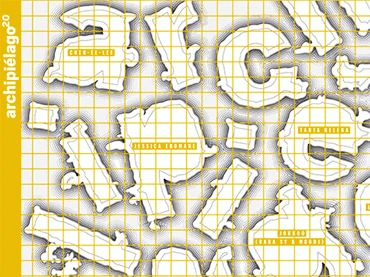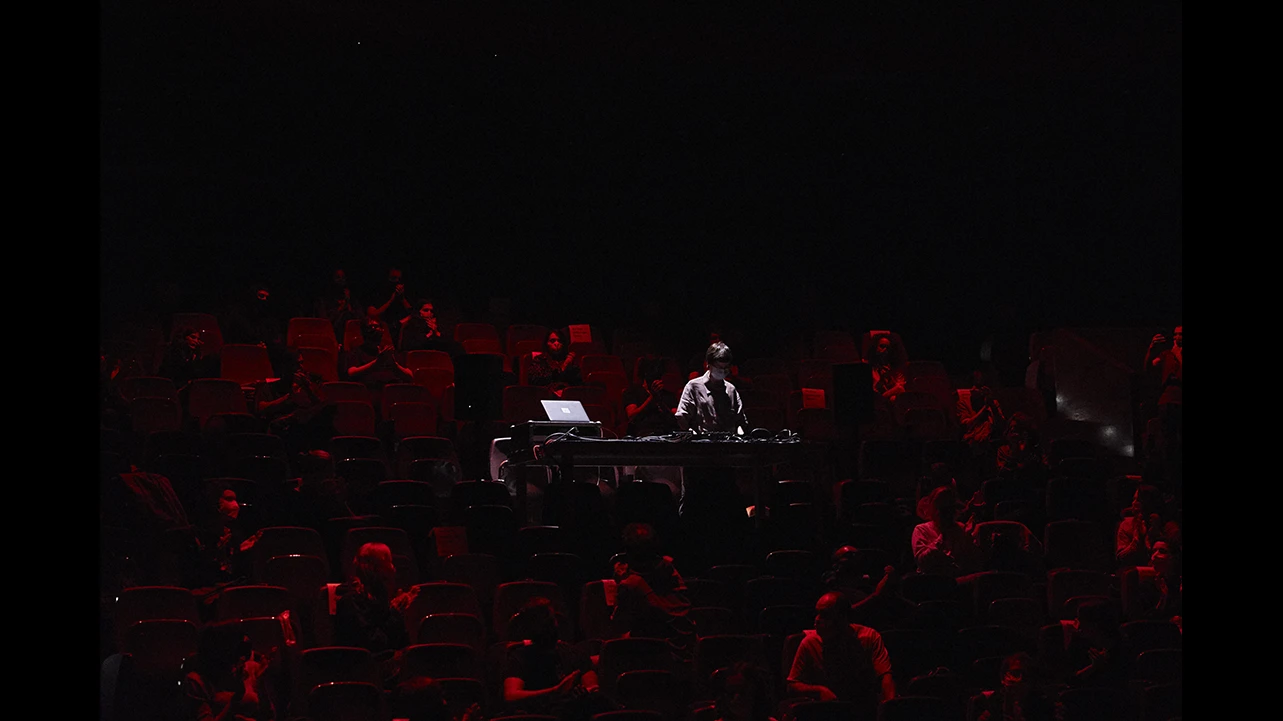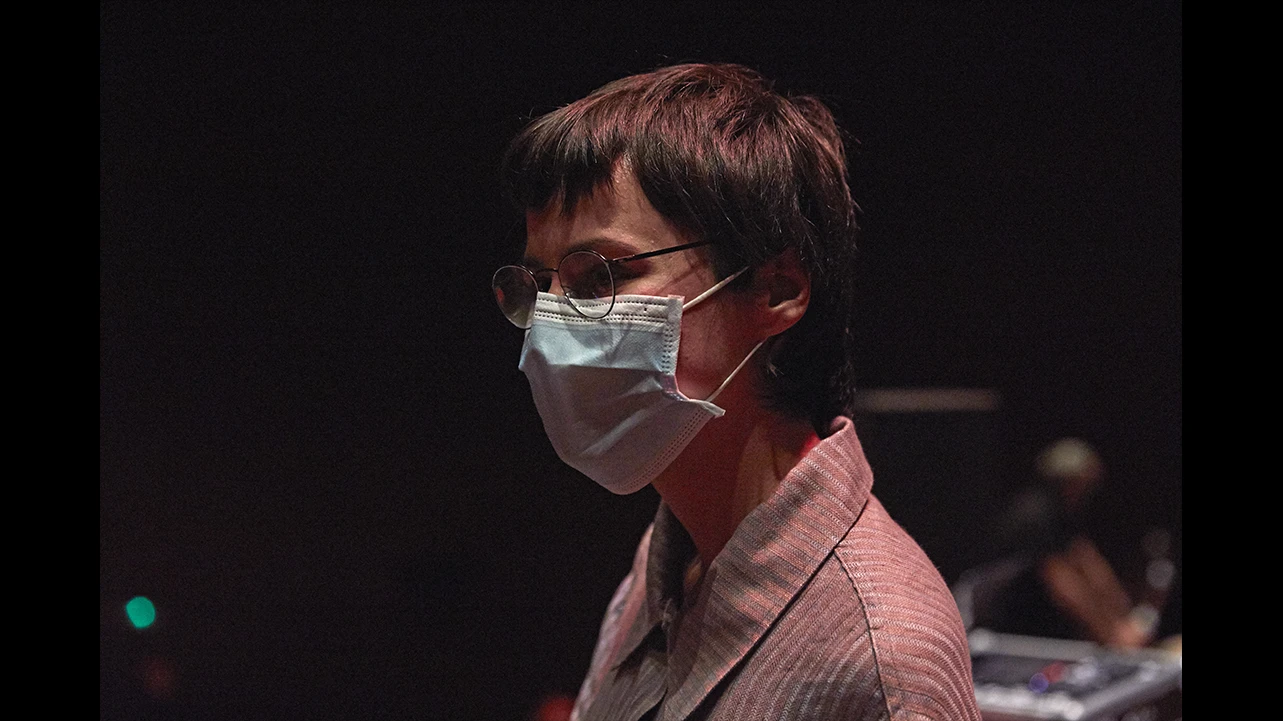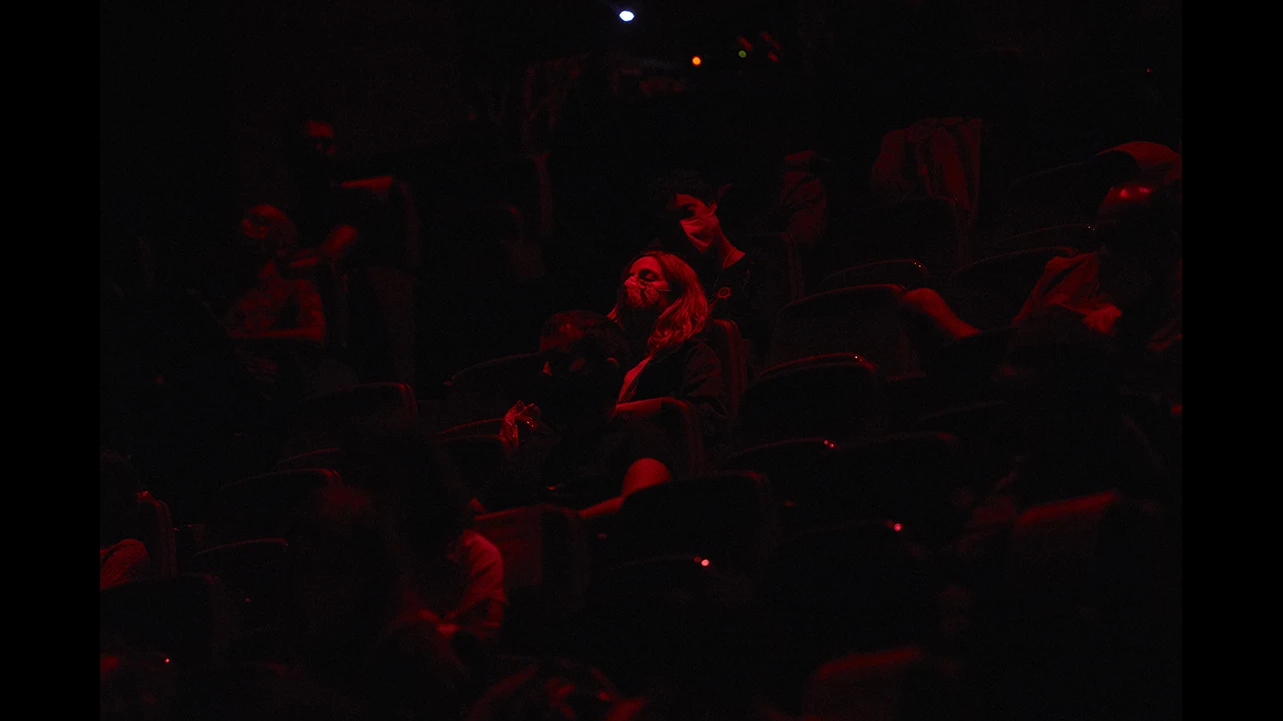
Archipielago 2020
Held on 18 Sep 2020
For a fourth consecutive year, the concert series Archipelago invites the audience to delve into the complex nature of the contemporary world through listening and explores the relationship between experimental music and popular culture by way of sounds from different narratives and geographies. The present edition continues to conduct research into that popular repertory as a form transmitting knowledge, questioning the globalising principles associated with notions such as experimentation and avant-garde.
Mix, transmission and mutation are terms which, musically, can have a positive meaning, and are aspects this concert series has always embraced. Yet today these words have become imbued with a negative connotation, reflecting the shift towards the hermeticism of nation states and their borders: How will contemporary music genres be affected? What about the different sound communities scattered around the world? To what degree will it impact the practices of an entire generation of musicians? And the live music experience? How will local aspects be re-signified in this new setting? How will networks be re-built in a world where the freedom of movement and contact of bodies are limited?
In dealing with these enquiries, the latest edition of Archipelago assumes a novel format: all acts will take place outdoors in the Sabatini Building Garden via a quadrophonic arrangement of sound, placing the stress on the physicality of sound and offering DJ-led listening sessions, whilst drawing inspiration from the experience of diaspora. Concerts which look to reinvent popular culture and speculate on what is in store and on constructing in a particularly unpredictable future.
Programme
Friday, 18 September – from 7pm to 9pm
Doors open at 6:30pm
7pm - Cher-ee-lee
Cher-ee-lee is the moniker Jerilyn Gonçalves uses for her sessions and podcasts, some of which have featured on digital platforms such as Radio Relativa and KRAAK. Of note is her radio show Música para Camaleones (Music for Chameleons), in which she traces the plurality of directions taken by Venezuela’s sound heritage, within and beyond its borders, with the project leading Gonçalves to study her country’s music with the aim of, as she puts it, “building a home away from home”. Cher-ee-lee is a native from Caracas who had to move to Madrid, integrating into the community of Venezuelan expatriates settled in Spain, the largest in Europe. For Archipelago she leads a session around the captivating musical syncretism of Venezuela and its subsequent influence on manifestations of contemporary experimentation. In short, an invitation to discover an uncommon narrative on Venezuela’s fertile culture and history.
8pm - Jessica Ekomane
Rhythm, tone, time and space are probably the four variables that define the compositions of this French artist, residing in Berlin, who is a great admirer of Györgi Ligeti and Maryanne Amacher. In Archipelago, she performs a concert which, through the use of a quadrophonic system and the immersive nature of her sonic landscapes, seeks to trigger a cathartic effect among the audience as she employs her experience of making installations in which psychoacoustics are at the core. Ekomane’s pieces, moreover, depart from an investigation into the relationships between individual perception and collective dynamics, between listening and its social determinants. Multivocal (2019), her debut album, aptly demonstrates her rigorous aesthetics and working methodology — seemingly static, but ever-changing, to the point of inducing a kind of trance in the listener.
Saturday, 19 September – from 1pm to 2pm
Doors open at 12:30pm
1pm - Lucrecia Dalt
In recent years, this Berlin-based Colombian artist has developed a prolific career at the intersection of electroacoustic music, vocal experimentation and installation. Dalt’s work perpetually draws from myriad musical, literary and artistic references, moving between territories as far-reaching as science fiction, geology and animism. In this vein, it is worth highlighting the installation made in 2019, with Maria Thereza Alves, in the German capital’s botanical garden during the CTM festival, in which both gave a voice to tropical plants renamed under Western classifications. Her appearance at the festival also served to present No Era Sólida (2020) in a quadrophonic format, a record which delves into the strands already opened in Anticlines (2018). This latest work unfolds through Lia, a kind of projection of the artist that materialises vocally in an act which draws parallels with Interface, a poem by Chicana poet Gloria Anzaldúa in which she narrates her affaire with an extraterrestrial being; a queer and mestizo text, from which the title of the album originates.
Saturday, 19 September – from 6pm to 9pm
Doors open at 5:30pm
6pm - Jokkoo (Baba Sy & Mbodj)
The Jokkoo collective came into being in Barcelona in 2017 to disseminate music and sound narratives from the African continent and its diasporas. Despite a markedly electronic identity, their sounds did not find a place on the dance floors of the Catalan city. Thus, Baba Sy and Mbodj (Maguette Dieng) — joined by Opoku, Mookie and B4mba over the past year — decided to bring this musical ebullience to the fore at parties, events and a programme on the radio station Dublab, with reference points most notably including genres which, with a cosmic and futurist spirit, seek to transform the analysis of the past and foreground the present. This guided listening session focuses on the inheritance and echoes of the black Atlantic, a sound journey that is also an account of certain histories that closely run through this duo.
7pm - Tarta Relena
Tarta Relena is a Catalan duo, made up of Marta Torrella (contralto) and Helena Ros (soprano), that explores, a cappella, the sonorities of different oral tradition music and singer-songwriters related to the Mediterranean. Both came into contact with polyphony via choral music, leading them to explore renaissance and baroque repertoires, in addition to their background in musicology (Marta) and linguistics (Helena), which goes some way towards explaining their performances of ancient Sephardic, Greek, Corsican and Menorcan songs. Whilst respecting tradition, their aim is not to perpetuate it and both are quick to avoid any glimmer of purism — thus, they accept with humour the tag “progressive Gregorian” in defining their music. For Archipelago they put forward a concert that reflects the achievements of their outstanding debut, Ora pro nobis (2019), and more recently Intercede pro nobis (2020), a work which welcomes the introduction of subtle electronic arrangements.
8pm - Lucrecia Dalt
In recent years, this Berlin-based Colombian artist has developed a prolific career at the intersection of electroacoustic music, vocal experimentation and installation. Dalt’s work perpetually draws from myriad musical, literary and artistic references, moving between territories as far-reaching as science fiction, geology and animism. In this vein, it is worth highlighting the installation made in 2019, with Maria Thereza Alves, in the German capital’s botanical garden during the CTM festival, in which both gave a voice to tropical plants renamed under Western classifications. Her appearance at the festival also served to present No Era Sólida (2020) in a quadrophonic format, a record which delves into the strands already opened in Anticlines (2018). This latest work unfolds through Lia, a kind of projection of the artist that materialises vocally in an act which draws parallels with Interface, a poem by Chicana poet Gloria Anzaldúa in which she narrates her affaire with an extraterrestrial being; a queer and mestizo text, from which the title of the album originates.
With the sponsorship of:
Curators:
Rubén Coll and José Luis Espejo
Collaboration:
Organised by
Museo Reina Sofía
Sponsorship:







Más actividades
![Tracey Rose, The Black Sun Black Star and Moon [La luna estrella negro y negro sol], 2014.](https://recursos.museoreinasofia.es/styles/small_landscape/public/Obra/AD07091_2.jpg.webp)
On Black Study: Towards a Black Poethics of Contamination
Monday 27, Tuesday 28 and Wednesday 29 of April, 2026 – 16:00 h
The seminar On Black Study: Towards a Black Poethics of Contamination proposes Black Study as a critical and methodological practice that has emerged in and against racial capitalism, colonial modernity and institutional capture. Framed through what the invited researcher and practitioner Ishy Pryce-Parchment terms a Black poethics of contamination, the seminar considers what it might mean to think Blackness (and therefore Black Study) as contagious, diffuse and spreadable matter. To do so, it enacts a constellation of diasporic methodologies and black aesthetic practices that harbor “contamination” -ideas that travel through texts, geographies, bodies and histories- as a method and as a condition.
If Blackness enters Western modernity from the position of the Middle Passage and its afterlives, it also names a condition from which alternative modes of being, knowing and relating are continually forged. From within this errant boundarylessness, Black creative-intellectual practice unfolds as what might be called a history of touches: transmissions, residues and socialities that unsettle the fantasy of pure or self-contained knowledge.
Situated within Black radical aesthetics, Black feminist theory and diasporic poetics, the seminar traces a genealogy of Black Study not as an object of analysis but as methodological propositions that continue to shape contemporary aesthetic and political life. Against mastery as the horizon of study, the group shifts attention from what we know to how we know. It foregrounds creative Black methodological practices—fahima ife’s anindex (via Fred Moten), Katherine McKittrick’s expansive use of the footnote, citation as relational and loving labour, the aesthetics of Black miscellanea, and Christina Sharpe’s practices of annotation—as procedures that disorganise dominant regimes of knowledge. In this sense, Black Study is approached not as a discrete academic field but as a feel for knowing and knowledge: a constellation of insurgent practices—reading, gathering, listening, annotating, refusing, world-making—that operate both within and beyond the university.
The study sessions propose to experiment with form in order to embrace how ‘black people have always used interdisciplinary methodologies to explain, explore, and story the world.’ Through engagements with thinkers and practitioners such as Katherine McKittrick, C.L.R. James, Sylvia Wynter, Christina Sharpe, Fred Moten, Tina Campt, Hilton Als, John Akomfrah, fahima ife and Dionne Brand, we ask: What might it mean to study together, incompletely and without recourse to individuation? How might aesthetic practice function as a poethical intervention in the ongoing work of what Sylvia Wynter calls the practice of doing humanness?

Intergenerationality
Thursday, 9 April 2026 – 5:30pm
This series is organised by equipoMotor, a group of teenagers, young people and older people who have participated in the Museo Reina Sofía’s previous community education projects, and is structured around four themed blocks that pivot on the monstrous.
The third session gazes at film as a place from which to dismantle the idea of one sole history and one sole time. From a decolonial and queer perspective, it explores films which break the straight line of past-present-future, which mix memories, slow progress and leave space for rhythms which customarily make no room for official accounts. Here the images open cracks through which bodies, voices and affects appear, disrupting archive and questioning who narrates, and from where and for whom. The proposal is at once simple and ambitious: use film to imagine other modes of remembering, belonging and projecting futures we have not yet been able to live.

Remedios Zafra
Thursday March 19, 2026 - 19:00 h
The José Luis Brea Chair, dedicated to reflecting on the image and the epistemology of visuality in contemporary culture, opens its program with an inaugural lecture by essayist and thinker Remedios Zafra.
“That the contemporary antifeminist upsurge is constructed as an anti-intellectual drive is no coincidence; the two feed into one another. To advance a reactionary discourse that defends inequality, it is necessary to challenge gender studies and gender-equality policies, but also to devalue the very foundations of knowledge in which these have been most intensely developed over recent decades—while also undermining their institutional support: universities, art and research centers, and academic culture.
Feminism has been deeply linked to the affirmation of the most committed humanist thought. Periods of enlightenment and moments of transition toward more just social forms—sustained by education—have been when feminist demands have emerged most strongly. Awareness and achievements in equality increase when education plays a leading social role; thus, devaluing intellectual work also contributes to harming feminism, and vice versa, insofar as the bond between knowledge and feminism is not only conceptual and historical, but also intimate and political.
Today, antifeminism is used globally as the symbolic adhesive of far-right movements, in parallel with the devaluation of forms of knowledge emerging from the university and from science—mistreated by hoaxes and disinformation on social networks and through the spectacularization of life mediated by screens. These are consequences bound up with the primacy of a scopic value that for some time has been denigrating thought and positioning what is most seen as what is most valuable within the normalized mediation of technology. This inertia coexists with techno-libertarian proclamations that reactivate a patriarchy that uses the resentment of many men as a seductive and cohesive force to preserve and inflame privileges in the new world as techno-scenario.
This lecture will address this epochal context, delving into the synchronicity of these upsurges through an additional parallel between forms of patriarchal domination and techno-labor domination. A parallel in which feminism and intellectual work are both being harmed, while also sending signals that in both lie emancipatory responses to today’s reactionary turns and the neutralization of critique. This consonance would also speak to how the perverse patriarchal basis that turns women into sustainers of their own subordination finds its equivalent in the encouraged self-exploitation of cultural workers; in the legitimation of affective capital and symbolic capital as sufficient forms of payment; in the blurring of boundaries between life and work and in domestic isolation; or in the pressure to please and comply as an extended patriarchal form—today linked to the feigned enthusiasm of precarious workers, but also to technological adulation. In response to possible resistance and intellectual action, patriarchy has associated feminists with a future foretold as unhappy for them, equating “thought and consciousness” with unhappiness—where these have in fact been (and continue to be) levers of autonomy and emancipation.”
— Remedios Zafra

ARCO2045. The Future, for Now
Saturday 7, March 2026 - 9:30pm
The future, its unstable and subjective nature, and its possible scenarios are the conceptual focus of ARCOmadrid 2026. A vision of the future linked to recent memory, a flash of insight into a double-edged sword. This year's edition, as in the previous two, will once again hold its closing party at the Reina Sofia Museum. This time, the star of the show is Carles Congost (Olot, Girona, 1970), one of the artists featured in the new presentation of the Collections recently inaugurated on the 4th floor of the Sabatini Building.
Carles Congost, with his ironic and timeless gaze, is responsible for setting the tone for this imperfect future, with a DJ session accompanied by some of his works in the Cloister on the first floor of the Sabatini Building of the Museo on the night of Saturday 7 March.

27th Contemporary Art Conservation Conference
Wednesday, 4, and Thursday, 5 March 2026
The 27th Contemporary Art Conservation Conference, organised by the Museo Reina Sofía’s Department of Conservation and Restoration, with the sponsorship of the Mapfre Foundation, is held on 4 and 5 March 2026. This international encounter sets out to share and debate experience and research, open new channels of study and reflect on conservation and the professional practice of restorers.
This edition will be held with in-person and online attendance formats, occurring simultaneously, via twenty-minute interventions followed by a five-minute Q&A.
